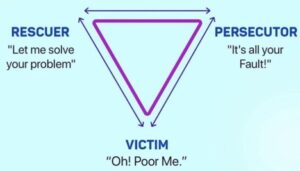You have to live your life among humans. Even if you were stranded on a deserted island, you’d still be living with a human. (Hint: you’re a human). Because of this reality, you will experience drama. It’s not good or bad. It just is. Drama is the inevitable disruption of calm that we create when we have disagreement, misunderstanding, emotional mis-matches, expectation mis-matches, entitlement, accusation, betrayal, deceit, or gossip. It’s the dust-up of relationships.
From the time when we were little boys, we have intuitively tried to address drama. We want it to go away. One could argue that the rare person that loves drama is actually trying to resolve an internal drama they are carrying.
These attempts at restoration range from ignoring drama that is happening, adding to it, blaming, reasoning, avoiding, and/or telling the other person to “just calm down” — a technique that has never worked in the history of calming down.
The Roles We Play in Conflict
We want to introduce a solution to drama that won’t just work in your friendships and romantic life, but can make you a powerful leader in times of tension.
This solution is an expansion on the Karpman Drama Triangle. You might’ve heard of it.
Essentially, the Karpman Drama Triangle suggests that a lot of conversational drama happens when we cast ourselves and others into specific roles in a conflict.

In any conflict, we default to creating a cast of Victims, Persecutors, and Rescuers:
- The Victim is the one saying “I’m helpless. I’m powerless. I could not have done anything different given the circumstances or the behavior of others.”
- The Persecutor is the one doing the blaming, accusing, or attacking. They are defensive and retaliatory. They are a dog cornered or a finger wagging. You might often hear them say things like “Who do you think you are?!”
- The Rescuer is the one who tries to save. They can often be the enabler, the peace-keeper, or the Pollyanna. They have superpowers like people-pleasing, caretaking, and downplaying.
We routinely find ourselves in this triangle. But what can we do about it?
Ways We Can Flip the Script
To rid your world of a lot of drama, don’t take on any single one of these roles. And, when you sense yourself acting into one of them, press pause and make an adjustment:
- If you default to playing the Victim (feeble, martyr, melodramatic), choose to get hungry. Look for ways you can learn and grow from this conversation, this feedback, this tension.
- If you naturally become the Persecutor (certain, legalistic, critical), choose to be curious about the root causes or ideas being expressed instead of thinking someone else needs to be fixed or changed.
- If you like being the Rescuer (controlling, saving, softening), choose to become a powerful coach. Invite people to raise their game. Be direct and clear. Give space for all the emotions. Expect people to be resourceful instead of being their resource.
How To Get Started
- Think of the last drama you experienced.
- Tell the story from the perspective of the ultimate victim.
- Tell it from the perspective of the ultimate villain (persecutor).
- Tell it from the perspective of the ultimate hero (rescuer).
- Now, identify which one came easiest to you.
- From the points above, tell the story how you might have “flipped the script” from the role that was easiest for you.
The next time you find yourself in a compelling story, pause and consider which is more important: Making a point? Or making a difference?


